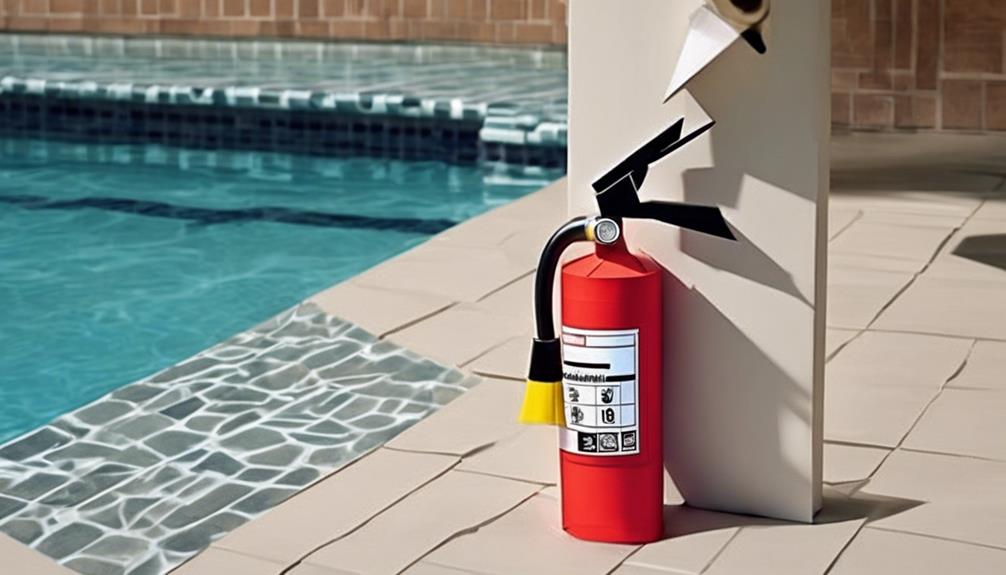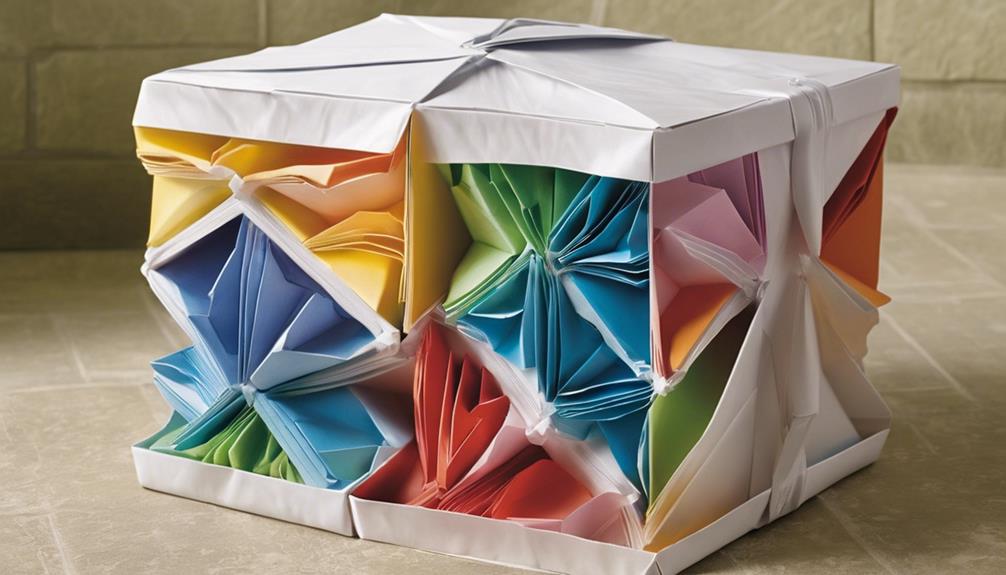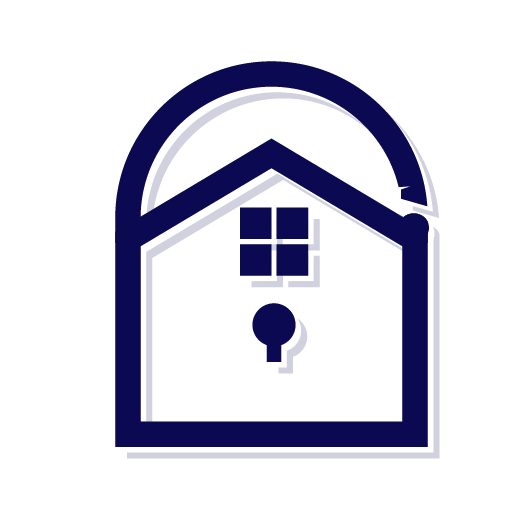So, you've created a relaxing oasis in your backyard with a beautiful swimming pool. However, have you considered all the necessary precautions to ensure the safety of your haven? When it comes to fire safety for homeowners with swimming pools, there are crucial tips you need to keep in mind. From the importance of having a poolside fire extinguisher to establishing a comprehensive emergency plan, these measures could make all the difference in a critical situation.
Poolside Fire Extinguisher

Having a fire extinguisher readily available poolside is essential for ensuring quick response in case of emergencies. When hosting a poolside BBQ or enjoying the warmth of a fire pit, the risk of fire-related accidents increases. To maintain a safe environment, it is crucial to have a fire extinguisher nearby at all times. Make sure the fire extinguisher is easily accessible and everyone knows its location. Familiarize yourself with how to operate the extinguisher beforehand, as this knowledge can make a significant difference in an emergency.
Poolside BBQs are a common summer activity, but they also pose fire hazards. Grease fires or sparks from the grill can quickly escalate, so having a fire extinguisher within reach is a proactive safety measure. Similarly, fire pit safety is paramount when having a fire feature near your pool. Embers or sparks can easily ignite nearby flammable materials, necessitating swift action with a fire extinguisher. Remember, prevention is key, but preparedness is equally important.
Electrical Safety Precautions
To ensure the safety of your home pool area, it is imperative to implement strict electrical safety precautions. When dealing with electricity near water, it is crucial to use proper grounding techniques to prevent the risk of electric shock. Ground fault circuit interrupters (GFCIs) should be installed to quickly cut off power in case of an electrical fault, reducing the chance of any accidents. Additionally, all outlets in the pool vicinity should be water-resistant to avoid water seepage into the electrical system. Regularly check the condition of these outlets and replace them if any signs of wear or damage are present. When using electrical appliances around the pool, ensure they are in good working condition and keep them away from the water. By following these guidelines and being vigilant about electrical safety, you can significantly reduce the chances of electrical accidents occurring in your pool area.
Proper Storage of Pool Chemicals

Implementing proper storage practices for pool chemicals is essential to maintain a safe and hazard-free environment in your pool area. When storing pool chemicals, it is crucial to keep them in a cool, dry, and well-ventilated area away from direct sunlight and sources of heat. Chemical storage should be organized, with each type of chemical kept in its original labeled container to avoid any mix-ups. Always ensure that lids are tightly sealed to prevent any leaks or spills that could lead to accidents.
Safety measures must be followed diligently, including wearing appropriate protective gear such as goggles and gloves when handling pool chemicals. It is advisable to store liquid chemicals below powders or solids to prevent any accidental spills onto other materials. Additionally, never mix different types of pool chemicals together as this can result in dangerous chemical reactions.
Clear Pool Area Debris
Clearing debris from your pool area is crucial to maintaining a safe and inviting environment for swimmers. Neglecting this task can not only affect the aesthetic appeal of your pool but also pose safety hazards. Here are some essential tips to help you keep your pool area clear and enjoyable:
- Regularly inspect and organize poolside furniture: Ensure that pool chairs, tables, and umbrellas are neatly arranged and free of clutter. Loose items can become tripping hazards or obstacles during emergencies.
- Stay on top of landscape maintenance: Trim overhanging branches, mow the lawn, and remove any plants or shrubs encroaching on the pool area. This prevents leaves, twigs, and other debris from falling into the pool.
- Invest in storage solutions: Use outdoor storage containers or sheds to keep pool toys, cleaning equipment, and other items neatly stored when not in use. This reduces clutter and minimizes the risk of accidents.
- Implement a cleaning schedule: Regularly sweep or use a leaf blower to clear debris from the pool deck and surrounding areas. This simple routine can make a significant difference in maintaining a clean and safe pool environment for everyone to enjoy.
Establish an Emergency Plan

Ensure that your pool area is not only aesthetically pleasing but also prepared for any potential emergencies by establishing a comprehensive emergency plan. Start by designating emergency exits and ensuring they are easily accessible from all areas of the pool. Clearly mark these exits with illuminated signs for visibility at night. Additionally, equip your pool area with life-saving devices such as lifebuoys, reaching poles, and first aid kits placed in easily accessible locations.
Develop a communication plan that includes emergency contact numbers for local emergency services, neighbors, and family members. Ensure that all individuals who use the pool area are aware of this plan and know how to communicate effectively during emergencies. Practice drills regularly to familiarize everyone with emergency procedures and evacuation routes.
Incorporate these drills into your routine to ensure that all pool users, including children, are well-prepared in the event of a fire or other emergency. By establishing an emergency plan that includes practice drills and a communication strategy, you can create a safer environment for everyone enjoying your pool.
Frequently Asked Questions
Are There Any Specific Regulations or Guidelines for Installing a Fire Extinguisher Near a Swimming Pool?
When it comes to fire safety and pool areas, it's crucial to have a fire extinguisher placed nearby. Safety guidelines often recommend installing a fire extinguisher within reach of the pool area to ensure quick access during emergencies. Proper placement is key to effectively addressing any potential fire hazards that may arise. Consider incorporating the fire extinguisher location into the pool area landscaping and design to seamlessly blend safety measures with aesthetics.
How Often Should Electrical Components Near the Pool Be Inspected for Safety?
You should ensure regular maintenance of electrical components near the pool for safety. Inspections should be conducted at least once a year by a qualified electrician to check for any potential hazards or malfunctions. This proactive approach not only keeps your pool area safe but also helps prevent electrical fires. Remember, electrical safety is crucial, so don't overlook the importance of routine inspections for peace of mind and security.
What Are the Best Practices for Storing Pool Chemicals to Prevent Fire Hazards?
When storing pool chemicals, ensure proper ventilation to prevent fire hazards. Always keep them in a cool, dry place away from direct sunlight. Store them in their original containers and tightly seal them after use. Never mix different chemicals. Additionally, install safety alarms near the storage area to alert you in case of any leaks or spills. Consider using a secure pool cover to further minimize risks.
How Can Homeowners Ensure That Pool Area Debris Is Regularly Cleared to Prevent Fire Risks?
To keep your pool area safe, regularly clearing debris is crucial. Debris can pose fire risks if left unchecked. By conducting regular maintenance and ensuring debris removal, you enhance fire prevention measures. Safety inspections should include checking for flammable materials near the pool. Be prepared with an emergency response plan in case of fire. Remember, "An ounce of prevention is worth a pound of cure."
What Should Be Included in an Emergency Plan Specifically Tailored for Fire Incidents Near a Swimming Pool?
In preparing for fire incidents near a swimming pool, your emergency plan should include detailed emergency drills and a clear communication plan. Ensure all family members know how to respond promptly during a fire emergency. Practice evacuation procedures regularly and establish designated meeting points. Keep emergency contact numbers easily accessible. By having a well-thought-out plan, you can effectively handle fire incidents near your pool and keep everyone safe.



